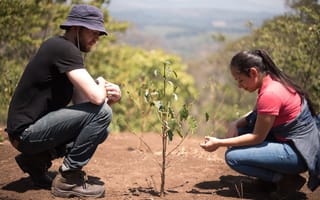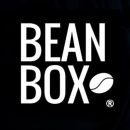Yeah yeah, we know: Seattle entrepreneurs talking about their coffee-related tech startups is just a Space Needle-and-rain reference away from Seattle cliche bingo.
But stick with us here, because the founders we spoke to for this article represent some of the best attributes of entrepreneurship in this city: ingenuity, social and environmental responsibility, support for the plucky underdog and, of course, fantastic coffee.

Onda Origins focuses on bringing coffee growers and consumers closer in ways that create economic, social and environmental benefits for both ends of the supply chain. Some of their methods are extremely high-tech — like using blockchain technology to trace coffee from origin to cup, and VR to immerse drinkers in the farms they’re supporting. Others — like bringing growers to the United States to meet their consumers — are rather simple.
“If we want our consumers to know our growers, we also want our growers to know our consumers,” explained Paul Tupper, who co-founded Onda Origins along with his brother, Scott.
What inspired you to start Onda Origins?
I had lived in a Costa Rican coffee growing community, and I saw that coffee growers are really divorced from the value they provide to the consuming world. The commodity price of coffee this year is close to what it was in 1977 and meanwhile, the price of a cup of coffee has risen dramatically in the last 40 years.
Guatemala is a good example of this. We just started sourcing from a Guatemalan grower named Ivonne Herrera, and she hasn’t been profitable for four years. Under the current system, her beans get mixed into the container and that’s it. That’s her one payday for the year. So if we can give her a livelihood and preserve her identity through traceability and through our storytelling, then we bring additional value to her and her consumers.
I want to give people an easy way to vote with their dollars in support of sustainability. So that’s kind of how the idea came to be — there’s a lot of people and a lot of land under the care of coffee and we think we can come up with a new, better value system.

What’s different about your approach to the coffee industry?
There’s a ton of greenwashing in coffee. I’m not throwing mud at anyone in particular, I’m just saying there’s a lot of it. It’s hard to tell what is only marketing and what is truly good. Most companies are somewhere in between. As a response to greenwashing, we said the best thing we can do is make our coffee traceable and transparent, and we’re going to do that using a distributed ledger. Customers will have proof that the grower was paid a living wage for their labor. If we can create communication between growers and consumers and bring those two closer, we’ll be able to more accurately satisfy consumers so they know where a product comes from, and provide better financial reward for growers.
We’ve always put an emphasis on storytelling, and on doing so in the words of the growers themselves as much as possible. Virtual reality is a way for us to show consumers the farm that their cup of coffee came from and the grower who made it. It’s a way to show that their coffee came from a really beautiful place, and from a lot of research and hard work. They feel like they’re on a three-minute holiday, and they learn a ton.
Where does the name come from?
“Onda” is Spanish and Portuguese for vibe, or wave, or ripple. Ripple’s my favorite translation. It’s hard to make a name for something, but we thought “onda” really evokes what we want to do. We want to help consumers and growers in a way that will have a ripple effect in those growing communities. If better wages can be passed to growers, international development research shows that that’s the key towards community and environmental betterment. It has to make economic sense to act sustainably. If you can’t feed your family, if you’re not profitable, you’re not concerned [about sustainability]. If you can put economic value to quality — which, in coffee, goes hand in hand with sustainability and good labor practices — then maybe you can make a wrinkle or a ripple in the world, and in this industry.

One Fall afternoon several years ago, brothers Nick and Brenden Martin had just spent Thanksgiving with their family in eastern Washington, and were driving back to Seattle when they decided to get a cup of coffee.
“We were noticing that these drive-throughs — businesses that are built for quick service — had these nine-car lines, people waiting 15 minutes for their coffee,” said Nick Martin.
Their solution — a mobile ordering app — mightn’t have been especially novel. (“I’m sure a lot of other people had the same idea,” Martin said.) But before long, Martin had quit his job as a marketing manager at Zillow to work on their idea full time. The Joe Coffee App is a tool for independent coffee shops to compete with Starbucks and other big chains in the heady world of online pre-ordering. They currently work with 20 businesses in Seattle, including Broadcast Coffee Roasters, Cloud City Coffee, Royal Drummer, Pegasus and Torino.
What inspired you to create the Joe Coffee App?
We’ve kind of been building and refining our idea in parallel with Starbucks. They rolled out mobile ordering in 2015 and they went from zero percent usage to 12 percent in Q1 this year.
The problem for small businesses is that they don’t have the money to invest in their own solutions. There’s no viable solution that lets these independent coffee shops compete on the convenience factor that Starbucks can offer. Then we saw Starbucks come out and make this statement that almost all of their same-store revenue growth — so all of their revenue that wasn’t driven by simply opening new stores — came through digital relationships.
We feel that by bringing the independent coffee category together, we can compete on that experience. We surveyed a bunch of folks, and learned that most people want to support independent coffee. They don’t want to consume corporate coffee — they want to support the little guy.
It feels like a refreshingly anti-corporate scene in a city that is feeling really corporate really quick.”
How does it work?
We’re free for independent coffee shops. The only expense they have is the credit card transaction fee, which goes to our credit card processor, and is the same as if someone were paying with a credit card in store. Our stores join in our umbrella rewards program, so that we can compete with Starbucks’ rewards. Buy 10, get one free, that kind of thing. And if reward giveaways ever account for more than 8 percent of their revenue, we’ll pay the difference, so there’s no risk for them there but it creates a really cool experience for consumers.
Every time you order, consumers pay a flat convenience fee of 30 cents, which we feel is pretty negligible. We made a deliberate decision to make it per transaction rather than a percentage, because we really want to encourage people to order multiple items and create a lot of value for the businesses that we’re supporting.
Where is the company going?
We’re building out a menu with modifiers so the app will reflect the unique menus you get in store. We’re focusing on keeping it quick and simple. We want it so that coffee shops will not have to train their staff on our platform — it’ll be very intuitive.
We just want to empower these small businesses to compete and grow. I think it’s easy to be fooled by just how robust the independent coffee scene feels, especially in Seattle. These owners pour their hearts and souls into these businesses — we hear stories of founders who cashed out their 401(k)s to open these stores. We love the idea of empowering the little guy and helping to keep independent stores as the stewards of coffee in Seattle, the mecca for coffee. It feels like a refreshingly anti-corporate scene in a city that is feeling really corporate really quick.

Matthew Berk and Ryan Fritzky founded Bean Box in 2014. The company ships curated packages of freshly-roasted coffee to subscribers, and boasted 50,000 users in the last 12 months. Berk’s background is in search and data mining technology, and said he was surprised to find just how applicable the skills he’d learned as a software engineer were to moving and manufacturing physical products.
“If you’re a software guy, your life is all electrons,” Berk said. “But now, in this company, we process a lot of atoms as well as electrons. We’ve had to apply things that I learned from being in software to how we handle all those beans.”
How did you get into this business?
Ryan and I actually started a different company together, a person-to-person recommendation app, and it didn’t work out. But while we were building that company, whenever we were interviewing customers, we’d say “Hey, we’ll buy you a cup of coffee and pick your brain.”
And so we developed this really chronic habit around talking to prospective customers and users and buying them cups of coffee. At the time our office was in Fremont, and we just had this amazing, amazing coffee right under our noses. We developed habits of getting bags of fresh-roasted coffee and sending it to folks, and when we went out of business, we decided to see if we couldn’t make something from that.
There are all these opportunities to apply what you’ve learned as a software engineer to managing things in the world.”
How do you use your tech background with Bean Box?
Aside from our credit card processing and email platform, we built literally everything else ourselves — our coffee catalogs, our manufacturing systems, our inventory systems, our website. We’ve built all of that in order to be able to scale.
There are two parts to what we engineer. There’s bringing people in, the software we use to sell to them and fulfill their orders, and the second part is all the engineering around processing and handling all that coffee. Last year we shipped 33 tons of coffee and this year we’ll ship something like 75 tons — maybe more.
Pretty much everything we do is run by software — we joke that we’re really a software business that just happens to deliver coffee.
What lessons have you learned?
I think one thing that’s really been eye-opening for us is that when you’re a digital marketer, for whatever reason, you’re drawn to things that are slick and polished and, for lack of a better word, markety. We’ve learned that the best way to bring in and handle customers is to be super authentic. That’s in everything from the voice of our emails, to little pictures of us on the site, to having packaging that’s really simple and clean.
As a software engineer, you tend to think about things in terms of code, data structures and algorithms. But there are all these opportunities to apply what you’ve learned as a software engineer to managing things in the world — coffee, in our case — and to me that’s just super cool.






